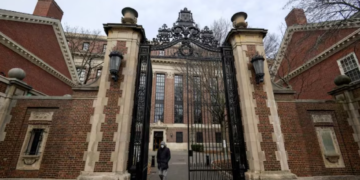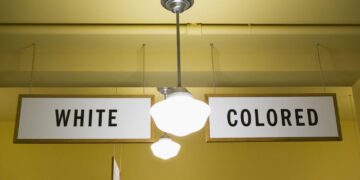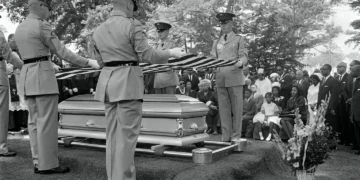Collingswood High School. Img source: njpen.com
May 28, 2024 Story by: Editor
In light of recent racial bullying and the alleged creation of a white identity group at Collingswood High School, the borough’s Diversity, Equity, and Inclusion (DEI) Committee hosted a panel discussion titled “Amplifying Black Voices.” This event provided residents an opportunity to share their personal experiences with race in the community.
Last February, Black and brown students at Collingswood High School (CHS) held a weeklong walkout to protest perceived disproportionate disciplinary actions from an almost entirely white district staff. This sparked a multifaceted response from the district and community.
During a subsequent community conversation, students and their families voiced long-standing grievances about racial mistreatment within the Collingswood Public School district and the broader community.
In response, the community established the Collingswood DEI Committee, organized the borough’s first Juneteenth celebration, and committed the school district to a path of reconciliation.
Despite these efforts, cultural change has been slow, with the district facing challenges such as staff retention issues, leadership criticism, and operational hurdles, including a pending infrastructure referendum and labor negotiations.
This spring, a group of CHS students faced disciplinary action for allegedly forming a “white student union” in reaction to a Black student union and for racial bullying, which included vandalizing another student’s vehicle. The case is under investigation by borough police and the Camden County Prosecutor’s Office, but no official outcome has been announced. The Collingswood Board of Education has authorized a third-party investigation by the law firm Madden & Madden into the district’s handling of racial bias incidents.
Students continue to report racial bullying, particularly from white male students towards Black and brown female students. In response, Collingswood borough government, school district, and police issued a joint statement condemning the behavior and outlining responses to it.
On May 16, the “Amplifying Black and Brown Voices” panel discussion took place at the Collingswood Senior Community Center. Longtime Black and brown residents shared their experiences, revealing stark differences from those of their white counterparts and highlighting persistent racial issues at the high school.
Nadine Herring spoke about the exhaustion of being asked by white coworkers to explain the actions of other Black people whenever racially charged news stories emerged. Herring, an educator of 30 years, described bracing for uncomfortable conversations at work.
“I don’t want to talk about it,” Herring said. “Every time there’s something going on on the news… I brace myself. It’s exhausting. If a Black person does something, it is the whole race; if a white person does something, it’s just that person.”
Herring also shared incidents of racial hostility she faced in her community, including finding feces on her steps and porch and the theft of her child’s bike, which police dismissed by suggesting the perpetrator was likely from outside the borough.
Zakiya Devine discussed her anxiety about police violence against Black women, which led her to create an evacuation plan for her children. Her fear has her raising her children differently, relying on her white husband to interact with law enforcement.
“That is just in my mind,” Devine said. “When we see a police officer, I immediately start crying… I am absolutely terrified that no matter how well-spoken and educated I am, it doesn’t matter.”
Daitza Cohen recounted how systemic bias impacted her life, including a high school incident that led to an arrest for a national threat due to a misunderstanding. This incident followed her into adulthood, affecting her travel and career opportunities.
Marcus Bell shared how a traumatic traffic stop at 17, where a gun was drawn on him, continues to affect his interactions with law enforcement. Even reporting a burglary led to him being treated as a suspect by local police.
Bell hosts high-school team sports dinners at his home to foster community among local teens but has observed racial segregation even within these gatherings.
“You have to be intentional about your relationship with kids… Unfortunately, as I watch it, it looks an awful lot like the cafeteria: white kids sit together, Black kids sit together,” Bell said. “Children follow what they see adults do, so it’s time for children to see adults do something different.” Source: NJ Pen
The panel underscored the need for the community to listen and act on these shared experiences to foster a more inclusive environment.

















